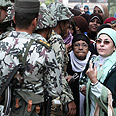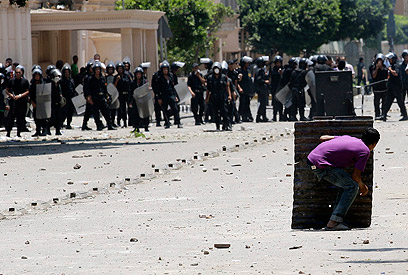
The Muslim Brotherhood said the parliament that emerges from Egypt's landmark elections should form a government, setting the stage for possible confrontation between Islamists and the ruling generals who have only just named a new prime minister.
The results of the first phase of the three-stage poll which could bring the Muslim Brotherhood closer to power were due to start coming out on Wednesday, but the military council which took over from ousted President Hosni Mubarak has yet to step aside.
Related stories:
- Egypt parliament elections underway Egypt: Foreigners suffer growing animosity
- Egypt: Tens of thousands rally in Tahrir Square
Millions of voters went to the polls in a mostly peaceful two-day vote, though the calm was shattered on Tuesday night when nearly 80 people were wounded in violence focused around a Cairo sit-in protest by activists demanding an end to army rule.

Security forces in Cairo (Reuters)
The election for Egypt's lower house is due to conclude in early January but early results were expected to trickle out on Wednesday after a high turnout and only minor infringements were reported.
Brotherhood hoping for 30%
Though the Muslim Brotherhood went into the polls stronger than nascent secular parties, analysts say it is hard to predict the outcome given that most of the electorate are casting their ballots for the first time.
Election monitors reported logistical hiccups and some campaign violations but no serious violence to disrupt proceedings. Election posters and banners festooned towns and cities while judges officiated under the eye of troops, police and election monitors.
The outcome of the election in one of the Middle East's most influential powers will help shape the future of a region convulsed by uprisings against decades of autocracy.
Though it did not start the Egyptian uprising, the Muslim Brotherhood has emerged as a major beneficiary of the revolt. The group, outlawed by Mubarak and his predecessors, is now in sight of a role in shaping the country's future.
The Freedom and Justice Party (FJP), the Muslim Brotherhood's political wing established earlier this year, said Egypt's new parliament should form the government.
"A government that is not based on a parliamentary majority cannot conduct its work in practice," FJP head Mohamed Mursi told reporters during a tour of polling stations in the working-class district of Shubra in Cairo.
"Therefore we see that it is natural that the parliamentary majority in the coming parliament will be the one that forms the government," said Mursi, adding:
"We see that it is better for it to be a coalition government built on a majority coalition in the parliament."
A senior figure in the once-banned Muslim Brotherhood said its FJP had done well in the voting so far.
"The Brotherhood party hopes to win 30 percent of parliament," Mohamed El-Beltagy told Reuters.
The success of the first phase has deflected criticism faced by the military council, which has been under pressure from street protesters over what they see as the generals' attempts to maintain power and privilege in the post-Mubarak era.
International praise
The military council has said turnout would exceed more than 70 percent, though the FJP's Mursi said indications showed a lower figure of 40 percent.
In one of the military's first reactions to the election's first phase, General Ismail Atman, a ruling army council member, was quoted by Al-Shorouk newspaper as saying the poll showed the irrelevance of the Tahrir Square protest.
In criticism of the military-run government, leading reformist politician Mohamed ElBaradei wrote on his Twitter feed: "Thugs are now attacking the protesters in Tahrir. A regime that cannot protect its citizens is a regime that has failed in performing its basic function."
The term thugs was often used to describe violent pro-Mubarak elements who disrupted elections in the rigged polls of the past and who used camels in the final days of the Mubarak era to try and intimidate protesters in Tahrir Square.
Many Egyptians were worried elections would be bloody. Instead, the vote won international praise.
UN Secretary-General Ban Ki-moon congratulated Egyptians on the first stage of the election and the "generally calm and orderly manner in which voting took place", a statement from his office said.
- Receive Ynetnews updates
directly to your desktop















